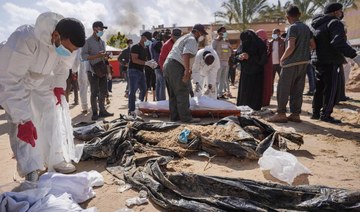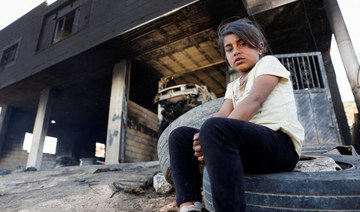RAFAH: A baby girl was delivered from the womb of a Palestinian killed along with her husband and daughter by an Israeli attack in the Gaza city of Rafah, where 19 people died overnight in intensified strikes, Palestinian health officials said.
The dead, killed in hits on two houses, included 13 children from one family, they said.
The baby, weighing 1.4 kg and delivered in an emergency C-section, was stable and improving gradually, said Mohammed Salama, a doctor caring for her.
Her mother, Sabreen Al-Sakani, had been 30 weeks pregnant.
The baby was placed in an incubator in a Rafah hospital alongside another infant, with the words “The baby of the martyr Sabreen Al-Sakani” written on tape across her chest.
Sakani’s young daughter Malak, who was killed in the strike, had wanted to name her new sister Rouh, meaning spirit in Arabic, said her uncle Rami Al-Sheikh. “The little girl Malak was happy that her sister was coming to the world,” he said.
The baby would stay in hospital for three to four weeks, said Salama, the doctor. “After that we will see about her leaving, and where this child will go, to the family, to the aunt or uncle or grandparents. Here is the biggest tragedy. Even if this child survives, she was born an orphan,” he said.
The 13 children were killed in a strike on the second home, belonging to the Abdel Aal family, according to Palestinian health officials. Two women were also killed in that strike.
Asked about the casualties in Rafah, an Israeli military spokesperson said various militant targets were struck in Gaza including military compounds, launch posts and armed people.
“Did you see one man in all of those killed?” said Saqr Abdel Aal, a Palestinian man whose family were among the dead, grieving over the body of a child in a white shroud.
“All are women and children,” he said. “My entire identity has been wiped out, with my wife, children and everyone.”
Mohammad Al-Behairi said his daughter and grandchild were still under the rubble. “It’s a feeling of sadness, depression, we have nothing left in this life to cry for, what feeling shall we have? When you lose your children, when you lose the closest of your loved ones, how will your feeling be?” he said.
‘WE ARE TRAPPED’
Over half of Gaza’s 2.3 million people have crowded into Rafah, seeking shelter from the Israeli offensive that has laid waste to much of the Gaza Strip over the last six months.
Israel is threatening a ground offensive into the area, where Israeli Prime Minister Benjamin Netanyahu has said fighters from the militant group Hamas must be eliminated to ensure Israel’s victory in the war.
President Joe Biden has urged Israel not to launch a large-scale offensive in Rafah to avoid more Palestinian civilian casualties.
Palestinian health authorities say more than 34,000 people have been killed in Israel’s assault, which began after Hamas fighters attacked Israel on Oct. 7, killing some 1,200 people and abducting another 253, according to Israeli tallies.
The Palestinian health ministry said on Sunday that Israeli military strikes killed 48 Palestinians and wounded 79 others across Gaza Strip in the past 24 hours.
In the larger of the two Palestinian territories, the Israeli-occupied West Bank, Israel said its soldiers shot two Palestinians who tried to shoot and stab them on Sunday. The Palestinian health ministry said both men had died.
Abu Jehad, a Gaza City resident sheltering in Rafah with his family, said he was afraid the Israelis would invade Rafah unless a ceasefire is reached, and he would have to flee once again. “We are trapped and everyone awaits his turn to die,” said Abu Jehad, who was reached by phone.






















